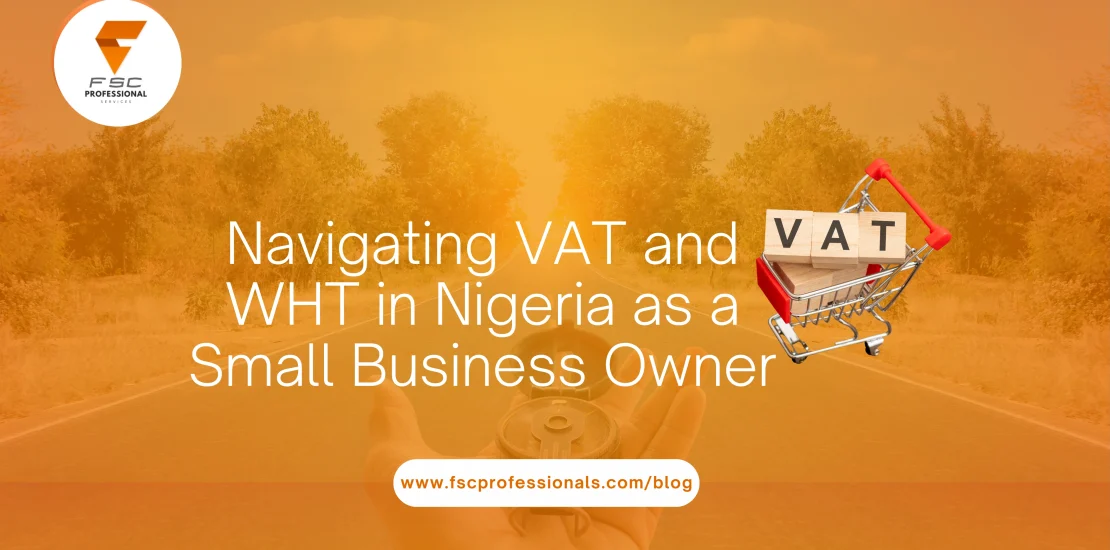- April 25, 2025
- Posted by: admin
- Category: Resources

Navigating VAT and WHT in Nigeria is a crucial part of running a compliant and financially healthy small business. These two taxes, Value Added Tax (VAT) and Withholding Tax (WHT), are among the most significant for Nigerian entrepreneurs. Despite their importance, many SMEs struggle to fully understand their obligations, leading to missed deadlines, costly penalties, and reputational risks.
This guide explores everything small business owners need to know about navigating VAT and WHT in Nigeria—from legal frameworks and registration to monthly filings and consequences of non-compliance.
We’ll break down how to stay compliant with regulations from the Federal Inland Revenue Service (FIRS), the Lagos State Internal Revenue Service (LIRS), and key legislation such as Section 14(3) of the VAT Act.
Understanding VAT in Nigeria
What is VAT and Why Does It Matter?
Value Added Tax (VAT) is a consumption tax charged on the value added at each stage of the supply chain. Currently set at 7.5%, it applies to most goods and services in Nigeria. For small businesses aiming to scale, knowing how to properly apply and remit VAT is critical for compliance.
Legal Framework and Key Rule: VAT operations are governed by the Value Added Tax Act Cap V1 LFN 2004 (as amended). A vital clause is Section 14(3), which mandates all VAT collection agents to file returns in the currency of the transaction by the 21st day of the month following the transaction.
Who Must Register for VAT in Nigeria?
- Businesses with annual turnover of N25 million and above must register for VAT.
- Businesses below the threshold can still opt for voluntary registration.
Key VAT Obligations:
- Register with FIRS and obtain a TIN.
- Charge 7.5% VAT on invoices for taxable goods/services.
- File monthly returns and remit VAT by the 21st.
- Use the FIRS TaxPro Max platform for digital compliance.
Consequences of Non-Compliance:
- N50,000 fine for first month of default, N25,000 monthly thereafter.
- Risk of audit, back taxes, and account restrictions by FIRS or LIRS.
Understanding Withholding Tax (WHT) in Nigeria
What is WHT? Withholding Tax (WHT) is a prepayment of income tax deducted at source on qualifying transactions. It’s a key mechanism used by FIRS and SIRS to improve tax compliance.
Transactions That Attract WHT:
- Professional services (legal, consulting)
- Rent, commissions, royalties
- Construction contracts and agency agreements
Applicable WHT Rates:
- 5% for individuals
- 10% for corporate entities (rates may vary)
WHT Legal Provisions:
- Based on the Companies Income Tax Act (CITA) and Personal Income Tax Act (PITA).
- Returns must be filed by the 21st of the following month.
WHT Filing & Remittance Steps:
- Deduct at the correct rate during payment.
- Remit to FIRS or SIRS by the due date.
- Submit returns and issue WHT credit notes to the payee.
Penalties for Non-Compliance:
- 10% penalty on unremitted amounts.
- Additional interest and risk of audits.
VAT vs WHT in Nigeria: Key Differences
| Criteria | VAT | WHT |
|---|---|---|
| Nature of Tax | Consumption-based | Income-based |
| Tax Burden | Passed to the end-consumer | Borne by service provider/vendor |
| Filing Frequency | Monthly (21st deadline) | Monthly (21st deadline) |
| Authority | FIRS | FIRS / SIRS |
| Typical Rates | 7.5% | 5%-10% |
| Who Files/Remits | Seller | Buyer/Payer |
Common VAT and WHT Mistakes Small Businesses Make
Understanding how to navigate VAT and WHT in Nigeria means avoiding these typical pitfalls:
- Failing to register for VAT despite meeting turnover thresholds
- Charging VAT but not remitting it on time
- Applying incorrect WHT rates
- Forgetting to file monthly returns
- Ignoring the need for WHT credit notes
- Confusing VAT filing obligations with WHT remittance duties
How FSC Professionals Can Help with VAT and WHT in Nigeria
At FSC Professionals, we simplify tax compliance for businesses through expert-led support:
- VAT registration, invoicing & return filing
- WHT calculation, deduction & credit note management
- Audit preparation and risk checks
- Hands-on training for finance teams
Let our team help you avoid errors and stay compliant with VAT and WHT laws in Nigeria.
Conclusion
Mastering how to navigate VAT and WHT in Nigeria is no longer optional—it’s essential for compliance, credibility, and sustainable growth. With regulations like Section 14(3) of the VAT Act, tax authorities are enforcing deadlines strictly.
Avoid penalties, stay ahead of audits, and operate with confidence. Whether you’re just starting or scaling up, let FSC Professionals handle the complexities so you can focus on growing your business.
